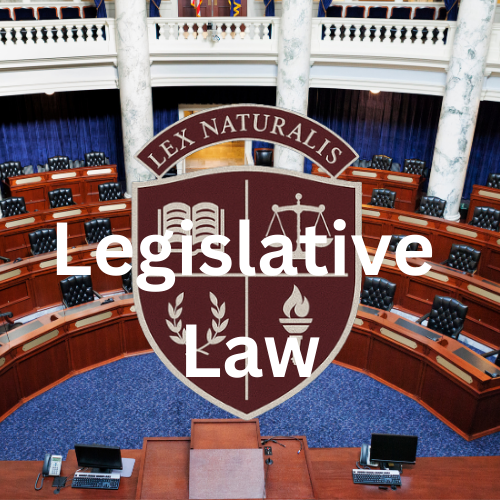Regulation and Malinvestment: An Austrian Reading of Legislative Failure
- Dr. Byron Gillory
- Sep 15
- 4 min read

I. The Lawgiver’s High Office
The legislator, as steward of the commonwealth, is entrusted with no small task. He must craft statutes that secure liberty, protect property, and preserve order. His pen is not a mere tool of politics, but the instrument by which justice is given civil form. When he writes with clarity and restraint, society flourishes; when he writes in haste and ignorance, confusion and disorder follow.
Yet in our present age, statutes often multiply beyond measure, spilling forth regulations so numerous and obscure that neither citizen nor jurist can fully know them. In such excess we see not the strength of law, but its corruption; not the flourishing of liberty, but its erosion.
II. The Austrian Lens: Malinvestment Defined
The economists of the Austrian school have taught with great force that prosperity depends not merely upon capital, but upon the right use of capital. When interest rates are distorted or signals in the market confused, resources flow into projects unsustainable in the long run. This misallocation they call malinvestment—investment not guided by genuine demand, but by false incentives.
What is true in economics is also true in jurisprudence. When statutes and regulations distort the natural signals of the market, they direct capital into wasteful channels, encourage enterprises that cannot endure, and suppress those that would otherwise prosper. Thus legislative failure becomes economic ruin.
III. How Regulation Breeds Malinvestment
Ambiguity and excess in regulation produce malinvestment in several ways:
Distorted Signals — When statutes set artificial prices, wages, or interest rates, they obscure the true conditions of supply and demand. Entrepreneurs, deceived by false signals, build enterprises that cannot stand once reality asserts itself.
Compliance Costs — Regulations that are complex or inconsistent draw capital away from productive use and into legal maneuvering. Instead of building factories, firms build compliance departments; instead of innovating, they litigate.
Privilege and Protection — When statutes confer advantage upon favored industries or companies, capital is drawn toward the politically powerful rather than the economically sound. Thus the law becomes the servant of faction rather than the guardian of liberty.
Uncertainty — Vague or frequently changing regulations paralyze investment, for no man will commit his savings to enterprises governed by rules that may tomorrow be altered or reinterpreted.
In all these, the law, intended to provide order, instead becomes the author of disorder.
IV. Historical Testimony
History furnishes ample witness to these truths.
In the mercantile systems of Europe, tariffs, quotas, and monopolies produced waste and stagnation, while nations that loosened such restraints flourished.
In the New Deal era, statutes delegated broad and uncertain powers to agencies, distorting prices and wages, and thereby prolonging the Great Depression.
In our own time, financial regulations, obscure and shifting, have bred speculative bubbles, misdirecting capital into short-term gain while starving long-term enterprise.
Each case reveals the same pattern: where regulation multiplies without clarity or restraint, capital is misallocated, liberty diminished, and prosperity deferred.
V. The Duty of Legislative Law
The discipline of Legislative Law exists to prevent such failure. The Legislative Counselor is not content to draft words that appease factions or satisfy momentary passions. His charge is to ensure that statutes are clear, general, and restrained, so that they uphold the rule of law without distorting the market’s natural order.
Thus his task is:
To resist vague delegations that empower agencies to legislate by decree.
To frame statutes that set rules, not outcomes; that secure contracts, not control prices.
To anticipate the economic signals statutes will send, and to draft so that capital is guided by genuine demand, not political whim.
By such discipline, Legislative Law can guard against the malinvestments born of statutory confusion and restore confidence in the law’s stability.
VI. Gillory & Associates: Restoring Integrity to Statutes
At Gillory & Associates, we hold that economic order cannot be divorced from legal order. A confused statute is not only a legal defect but an economic hazard. Through the Blackwell Institute for Legal Studies, we train a new class of Legislative Counselors who unite Blackstone’s jurisprudence with the insights of Mises and Hayek.
Our mission is clear: to draft statutes that respect the spontaneous order of the market, to prevent the distortions of regulation run wild, and to secure for future generations a legal framework where liberty and capital may alike prosper.
VII. Conclusion: Law as Guardian, Not Master
Regulation, when excessive or ambiguous, is the handmaiden of malinvestment. It bends the arc of capital toward projects doomed to fail, feeds privilege at the expense of fairness, and leaves citizens burdened with laws they cannot understand.
But when law is crafted in fidelity to clarity, restraint, and economic wisdom, it becomes the guardian of prosperity. It secures the ground upon which capital is formed, directing resources not by compulsion but by freedom.
Thus we affirm: the lawmaker’s task is not to command the market, but to safeguard its liberty. For in liberty lies the harmony of human action, and in harmony the true wealth of nations.
Comments